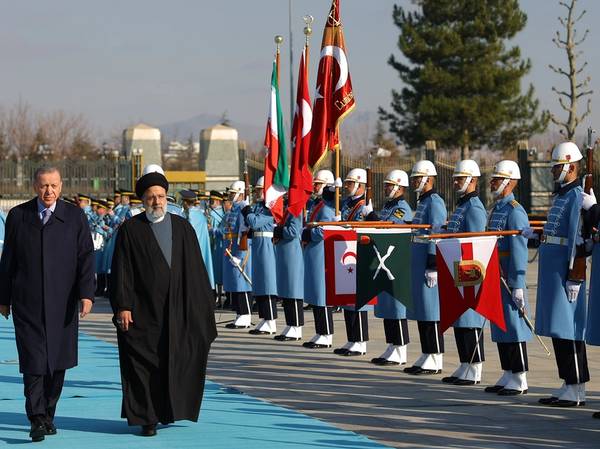Iranian President Ebrahim Raisi’s visit to Turkey this week came against the backdrop of the Gaza war, ongoing regional crisis and conflicts in bilateral relations.
The visit on Wednesday and the issues discussed reflected the intricate dynamics between Iran and Turkey. The visit resulted in ten agreements, emphasizing collaboration in energy, free trade, and transportation. This highlights the significance of political collaboration and dispute resolution in the Iran-Turkey relationship, striking a delicate balance between cooperation and addressing regional complexities amidst geopolitical challenges.
Raisi's visit highlighted ongoing efforts to strengthen economic relations, while forging an image of agreement on regional issues. While mutual distrust may persist, the visit and their evolving relationship indicate a continued effort to navigate complex ties, focusing on economic cooperation and potential areas of convergence in regional policies.
Challenges
Geopolitical competition, conflicting regional goals, and security concerns drive friction between Iran and Turkey. Despite joint efforts to combat terrorism, drug trafficking, and enhance regional security, political and ideological disagreements persist, heightened by the evolving political landscape in the Middle East. Historically, both nations have sought to exploit the shifting regional balance, intensifying rivalry, particularly in Syria and Iraq. Collaborative efforts against the PKK and PJAK and shared economic and security interests are overshadowed by significant differences.
While the Islamic Republic emphasizes the economic aspects of the relationship to improve morale at home, the significance of Raisi's visit to Ankara lies in discussions on regional security, stability, and shared concerns regarding terrorist groups and Kurdish factions. Raisi and Erdogan likely addressed Ankara's concerns about Kurdish groups viewed as "terrorists" in Turkey, Iran,Iraq, and Syria during their meeting. The bilateral talks also touched upon the impasse in Gaza, where Israel continues its operations against Hamas, a client of Iran and a friend of Turkey.
Gaza War
The Israel factor introduces complexity to the Turkey-Iran relationship, marked by historical ties encompassing trade, tourism, and some intelligence and military collaboration. Geopolitical shifts, particularly Turkey's stance on Syria to the detriment of Iran’s ally Bashar al-Assad, strain the ties.
The recent Gaza conflict has influenced the dynamics between Iran and Turkey, resulting in a mix of collaboration and tensions. The relationship's intricacies involve a blend of collaboration and rivalry, influenced by geopolitical, economic, and security factors. Khamenei's call to "cut vital lifelines" to Israel contrasts with Turkey's ongoing economic ties, highlighting nuanced dynamics. Turkey's pursuit of economic relations with Israel may diverge from Iran's objectives, as Tehran leverages the Gaza war to enhance its regional influence through proxy groups amid tensions.
Economic Cooperation
A wide range of circumstances have shaped Iran and Turkey's economic relations. Both countries have continued their business relations, particularly in the oil industry, despite Iran's economic difficulties and sanctions. The two sides have tried to find solution, such as "gas for commodities" and Iran’s natural gas exports. President Ebrahim Raisi's declared goal of increasing bilateral commerce to $30 billion annually is indicative of ambitious economic aspirations.
However, trade between Iran and Turkey reached a modest $4.4 billion in the first 10 months of 2023, a 16 percent decline from the same period the year before. Mehdi Safari, the Deputy for Economic Diplomacy at the Ministry of Foreign Affairs, mentioned that President's visit to Turkey would focus on strengthening energy cooperation, including the extension of the gas contract. Collaborative efforts in investing in Iran's gas resources and establishing an electricity connection from Khoy to Van were indeed discussed, but to what extent Raisi’s wish list would materialize is somewhat questionable. The present natural gas agreement between Iran and Turkey is scheduled to expire in 2026. This emphasizes the difficulties and unknowns involved in maintaining the two countries' economic partnership.
The anticipation is that Iran-Turkey relations will encompass both collaboration and rivalry, characterized by mutual mistrust alongside a maintained level of cooperation. Although a significant shift in their relationship might not be on the horizon, cooperation is expected to persist in counterterrorism, fighting drug trafficking, and promoting regional stability. Both nations have a track record of finding common ground amid occasional conflicts, navigating the complexities of their intricate relationship. The delicate balance between cooperation and rivalry is influenced by geopolitical realities and their respective objectives in Iran-Turkey relations.
President Raisi's visit to Turkey may not immediately resolve ongoing issues between the two countries. Beyond official statements, a comprehensive approach is necessary to examine conflicts and cooperation, particularly in areas like theSyrian crisis, and Kurdish issues. It's noteworthy that Iran's potential inability to supply more natural gas to Turkey due to anatural gas shortage adds another layer of complexity to the situation.
